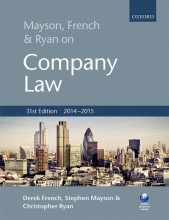Try our study magic for free
Summary: The Principles Of Equity And Trusts | 9780199570041 | Graham Virgo
- This + 400k other summaries
- A unique study and practice tool
- Never study anything twice again
- Get the grades you hope for
- 100% sure, 100% understanding
Remember faster, study better. Scientifically proven.
a PDF, study it super fast
- No sign up, email or credit card needed!
- AI makes unlimited flashcards
- Get unlimited quizzes and tests
- Ask AI anything
Create a notebook
- No sign up, email or credit card needed!
- Have and keep perfect overview
- Make flashcards, notes and mind maps
- Review, test and score!
Read the summary and the most important questions on The Principles of Equity and Trusts | 9780199570041 | Graham Virgo
-
3 Secret Trusts
This is a preview. There are 6 more flashcards available for chapter 3
Show more cards here -
Consequences of Not Complying Formalities
The will will be invalid and the properties will be devolved intestacy. -
Definition of Fully Secret Trusts
Fully ST is completely hidden from the will. B will appear to all intents and purposes to take the property beneficially. But the T intends the B to hold the gift on trust for somebody else. -
Definition of Half Secret Trusts
A half secret trust arises where a testator leaves property to a named person in a will to hold on the trusts that have been or will be declared. The existence of the trust is disclosed in T's will but the terms of the trust remain undisclosed. -
Other Possibilities of Secret Trust Arising
Both on the basis that B will deal with the property as agreed:- When the testator fails to revoke a gift made in an existing will
- When the testator fails to make a will at all
-
Rationales of Courts Upholding ST
- to prevent section 9 WA 1837 to be used as an instrument of fraud;
- secret trusts arise outside the will and is wholly separated from the will, so the WA does not apply.
-
General Requirements of Establishing Secret Trusts
In order for the court to recognise and enforce a secret trust, it is necessary to prove intention, communication and acceptance.
Test applied in fully ST: Ottaway v Norman
Test applied in half ST: Blackwell v Blackwell -
When Does The Secret Trust Take Effect?
It seems sensible to assume that a ST is completely constituted at the time of T's death. -
3.1 Fully Secret Trusts
This is a preview. There are 21 more flashcards available for chapter 3.1
Show more cards here -
Intention to Create an ENFORCEABLE MANDATORY TRUST OBLIGATION, not An UNENFORCEABLE MORAL OBLIGATION
The court demands evidence of an intention of the testator's part to create a trust in favour of secret beneficiary, rather than simply creating an unenforceable moral obligation on the secret trustee. -
Difference between Creating A Trustee Obligation and A Moral Obligation
The precatory and permissive wordings on the relevant trust instrument or letter are concerned. If the words used by the testator are permissive instead of mandatory, and there is no suggestion of it will be the court's authority, instead of the authority of the legatee, if the sanction is not carried out, then the court is likely to find there is no intention to create ST. -
Intention to Create An Immediate Trust Obligation
For example, T left £10,000 and a house to B and allows B to live in the house for as long as she lives and the remainder of the money will be passed on to the secret beneficiary. This is a sufficient intention on the testator's part to create a trust obligation on B even though the subject matter of the trust is not going to be certain until B dies.
Read the full summary
This summary +380.000 other summaries A unique study tool A rehearsal system for this summary Studycoaching with videos
- Higher grades + faster learning
- Never study anything twice
- 100% sure, 100% understanding
Topics related to Summary: The Principles Of Equity And Trusts
-
Secret Trusts - Fully Secret Trusts
-
Secret Trusts - Common Issues and Problems
-
Trustees' Powers and Duties and Personal Liability for Breach - Trust - Termination of Trusteeship
-
Trustees' Powers and Duties and Personal Liability for Breach - Trust - Remuneration of Trustees
-
Trustees' Powers and Duties and Personal Liability for Breach - General Duties of Trustees
-
Powers of Trustees - Administrative Powers - Power to Invest
-
Trustees' Powers and Duties and Personal Liability for Breach - Fiduciary Duties
-
Trustees' Powers and Duties and Personal Liability for Breach - Breach of Trust and Breach of Duty
-
Non-Charitable Purpose Trusts - General Invalidity of Non-Charitable Purpose Trusts
-
Non-Charitable Purpose Trusts - Unincorporated Associations































